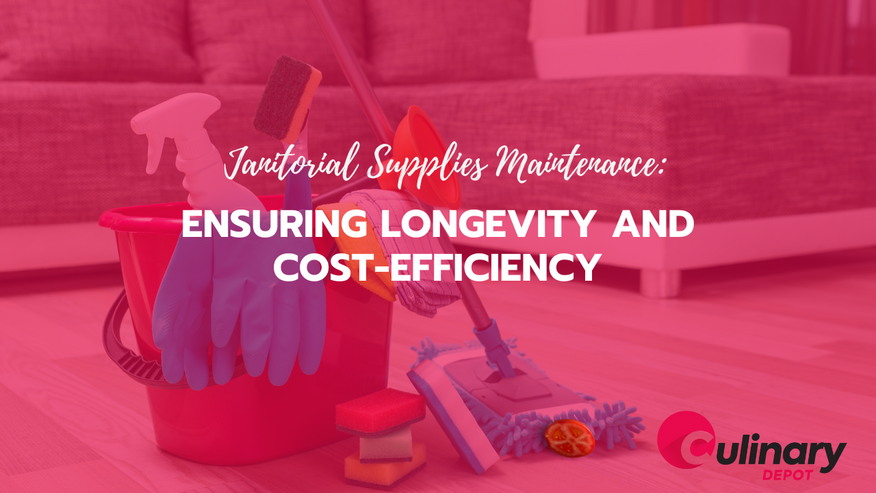Oct 23rd 2023 - Team Member
Janitorial Supplies Maintenance: Ensuring Longevity and Cost-Efficiency
Maintaining a clean and hygienic commercial kitchen is of paramount importance. To achieve this, janitorial supplies are a vital asset in your arsenal. However, to ensure their longevity and cost-efficiency, it's crucial to implement proper maintenance practices. In this guide, we will delve into the world of janitorial supplies and explore the best ways to maintain them, maximizing their lifespan and your budget.
Understanding the Role of Janitorial Supplies
Before we dive into maintenance, let's briefly examine the role of janitorial supplies in a commercial kitchen. These supplies encompass a wide range of items, including cleaning agents, disinfectants, trash bags, mop heads, brooms, and more. They are the unsung heroes that keep your kitchen sparkling and your patrons safe.
The Importance of Cleanliness

In the culinary world, cleanliness is non-negotiable. A hygienic kitchen is essential to prevent foodborne illnesses, ensure compliance with health regulations, and maintain the reputation of your establishment. Janitorial supplies are your allies in this ongoing battle against dirt, grime, and pathogens.
Cost-Efficiency Matters
While janitorial supplies are a necessary expense, managing their cost is essential for your bottom line. Proper maintenance can significantly extend the lifespan of these supplies, reducing the frequency of replacement and, in turn, saving you money.
Maintenance Tips for Janitorial Supplies
To keep your janitorial supplies in optimal condition and make the most of your investment, follow these maintenance tips:
1. Storage Matters

Proper storage is key to the longevity of janitorial supplies. Store cleaning agents and chemicals in a cool, dry place, away from direct sunlight. Mops, brooms, and brushes should be hung up or stored with bristle side up to prevent deformation.
2. Dilution Control
When using cleaning agents, always follow the manufacturer's recommended dilution ratios. Overuse can be wasteful and potentially damaging to surfaces, while underuse might lead to ineffective cleaning.
3. Regular Cleaning and Inspection
Cleaning supplies need cleaning too. Rinse and dry mop heads and brushes after each use. Inspect mop handles and other equipment for signs of wear, and replace or repair as necessary. This not only extends the life of your supplies but also ensures effective cleaning.
4. Labeling and Organization
Properly label your cleaning agents to prevent accidents and ensure correct usage. Organize your supplies in a dedicated area, so they are easily accessible when needed, promoting efficiency during cleaning routines.
5. Training and Education
Train your janitorial staff on the proper use and maintenance of supplies. Education about the correct application of cleaning agents and techniques can reduce waste and improve effectiveness.
6. Rotate Stock
To prevent chemicals or cleaning agents from deteriorating over time, use the "first in, first out" principle. This means using older supplies before opening new containers.
Bottomline: A Clean and Efficient Kitchen
Maintaining janitorial supplies isn't just about extending their lifespan; it's about upholding the cleanliness and efficiency of your commercial kitchen. Regular maintenance practices will lead to a safer, more hygienic environment, help you comply with regulations, and keep your costs in check.
So, whether it's scrubbing the floors, disinfecting surfaces, or ensuring your waste disposal is up to par, proper janitorial supply maintenance is your secret weapon for a spotless kitchen and a thriving restaurant.

